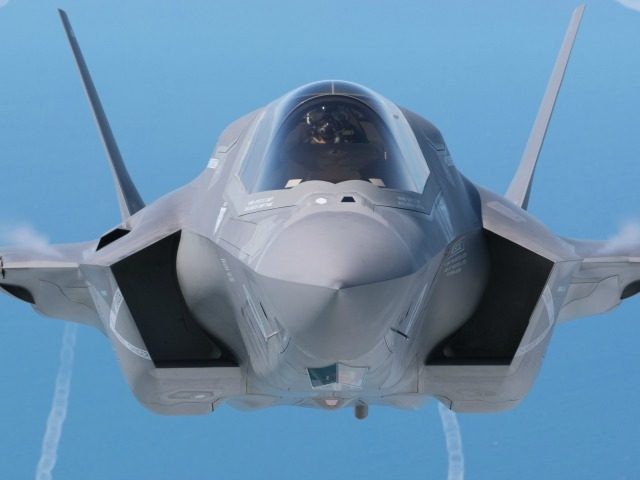The Pentagon on Wednesday halted delivery of F-35 jet fighters because investigators discovered a magnet in the engine system was manufactured using materials from China that did not comply with U.S. import laws.
The F-35, manufactured by Lockheed Martin, was developed under a notoriously expensive “joint strike fighter” program to produce an aircraft that could be used by every branch of the U.S. military, along with allied foreign forces. The F-35 is a fifth-generation fighter, representing the current state of the art.
Lockheed Martin said the troublesome magnet is a component of “the F-35 Turbomachine manufactured by Honeywell that includes cobalt and samarium alloy.”
“We are working with our partners and DoD [Department of Defense] to ensure contractual compliance within the supply chain. The magnet has no visibility or access to any sensitive program information. The F-35 remains safe for flight, and we are working with the DoD to resolve the issue as quickly as possible to resume deliveries,” the company said.
Honeywell, in turn, said it learned from one of its suppliers in August that another supplier was using magnet materials sourced to China. Honeywell then informed Lockheed Martin and cooperated with Pentagon investigators.
Materials sourced from China can be used in the F-35, but only with special waivers granted by the Pentagon. The necessary waiver was apparently not issued for this particular magnet.
British Carrier-Based F-35 Jet Crashes in Mediterranean, Pilot Safe https://t.co/T1xdSUtRLp
— Breitbart London (@BreitbartLondon) November 17, 2021
“We have confirmed that the magnet does not transmit information or harm the integrity of the aircraft and there are no performance, quality, safety or security risks associated with this issue and flight operations for the F-35 in-service fleet will continue as normal, F-35 Joint Program Office (JPO) spokesman Russell Goemaere said on Wednesday.
“Defense contractors voluntarily shared information with DCMA and the JPO once the issue was discovered and they have found an alternative source for the alloy that will be used in future turbomachines,” Goemaere added.
DCMA is the Defense Contract Management Agency, which alerted JPO about the unauthorized materials. DCMA is continuing its investigation to determine how the unauthorized materials became part of the supply chain for F-35 engines, potentially in violation of the Buy American Act and the Defense Federal Acquisition Regulation Supplement (DFARS).
Lockheed Martin and Honeywell both said American sources for the necessary magnet materials would be secured for future construction.
“Honeywell has stopped work with the supplier providing alloy, and an alternative U.S. source is already on order with anticipated delivery next month,” said Lockheed Martin spokeswoman Laura Siebert.
"Shares of Lockheed Martin Corp. dropped as much 3.4 percent after Trump’s tweet" https://t.co/bM07HUADhe
— Breitbart News (@BreitbartNews) December 12, 2016
Siebert could not specify how long it would take for alternative materials to make their way through the F-35 supply chain, or how long the Pentagon delivery pause would last. She said 88 F-35s have been delivered this year, and even with the delivery pause, the company expects to hit its target of at least 148 deliveries by the end of the year.
Undersecretary of Defense Bill LaPlante could issue a waiver allowing the F-35s already constructed with Chinese alloys to be accepted by the Pentagon, on the grounds that the safety and security of the planes has been adequately verified, and refusing to accept the aircraft could compromise U.S. national security interests.

COMMENTS
Please let us know if you're having issues with commenting.